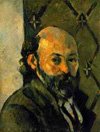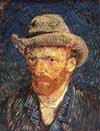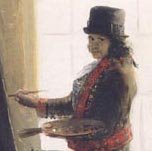Candle Hat
In mos
 t self-portraits it is the face that dominates:
t self-portraits it is the face that dominates:Cezanne is a pair of eyes swimming in brushstrokes,

Van Gogh stares out of a halo of swirling darkness,

Rembrandt looks relieved as if he were taking a
breather from painting The Blinding of Sampson.
 But in this one Goya stands well back from
But in this one Goya stands well back fromthe mirror and is seen posed in the clutter
of his studio addressing a canvas tilted
back on a tall easel.
He appears to be smiling out at us as if he
knew we would be amused by the
extraordinary hat on his head which is
fitted around the brim with candle
holders, a device that allowed him to work into the night.
 You can only wonder what it would
You can only wonder what it wouldbe like to be wearing such a
chandelier on your head as if you
were a walking dining room or concert hall.
But once you see this hat there is
no need to read any biography of Goya or to memorize his dates.
To understand Goya you only have to imagine him
lighting the candles one by one, then placing
the hat on his head, ready for a night of work.
Imagine him surprising his wife with his new invention,
the laughing like a birthday cake when she saw the glow.
Imagine him flickering through the rooms of his house
with all the shadows flying across the walls.
Imagine a lost traveler knocking on his door
one dark night in the hill country of Spain.
"Come in, " he would say, "I was just painting myself,"
as he stood in the doorway holding up the wand of a brush,
illuminated in the blaze of his famous candle hat.
In his poem, Collins emphasizes that Goya knew we would be amused by his silly image. He could only know this because he understood himself the absurdity of the human condition. As one critic observes, "Goya bears the light of this understanding." He goes on to say: "Beneath a dandy's hat, Goya wears an expression that his contemporaries considered satirical. His unmistakable mug with his snub nose, and smiling mischievously from beneath the brim of a curious hat, candles clipped to the hatband, he presents himself as, literally, a bearer of light--an ilustrado."
Indeed he is. His irrepressible image comes to us from over 200 years ago, reminding us to remember to laugh at the absurdity of the world that we have invented. "Absurd" comes from the Latin, surdus, meaning "stupid."
In His Course in Miracles, Jesus says it this way.
Into eternity, where all is one, there crept a tiny, mad idea, at which the Son of God remembered not to laugh. In his forgetting did the thought become a serious idea, and possible of both accomplishment and real effects. Together, we can laugh them both away, and understand that ltime cannot intrude upon eternity. It is a joke lto think that time can come to circumvent eternity, which means there is no time. T-27.V111.6:2-5
We take too seriously our tiny, mad idea that we could possibly separate from God. We can undo this seriousness by laughing. Laughter provides a moment of recognition of the absurdity of the mess we have gotten ourselves into by inventing this world. In that moment of recognition of this invention, our minds stop, allowing something else to enter in, a hint of the eternal.
The joke is on us, and we need always to be reminded of this. I am so grateful to those classic comedians whose trademark shtick still makes us laugh. They are truly light-bearers, demonstrating simply that this is not so, it is a joke too ridiculous, and in that recognition we have the opportunity realize the alternative, that we are as God created us, that we are not darkness, but light. We can exit laughing.
These are the images that come to mind of these great ilustrados.
Jack Benny gazes into the camera, deadpan, the palm of his right hand cupping his face, conveying far more than words could ever express.
Groucho Marx leers at the camera, his eyes laughing, a mischievous grin under his painted-on black moustache, exaggeratingly flicking ashes off of his cigar.
Dean Martin, handsome and suave, plays off of Jerry Lewis's screaming, petulant, mugging, pratfalling child.
Lou Costello explodes with pent up frustration, yelling "Ab. . .bott!" while Bud Abbott stands next to him, calmly.
Ricky Ricardo says sternly to Lucy, big-eyed, trying to look innocent, nervously playing with the bottom of her sweater, "Lucy, you cannot do the show."
Imagine a lost traveler knocking on his door
one dark night in the hill country of Spain.
"Come in," he would say, "I was just painting myself,"
as he stood in the doorway holding up the wand of a brush,
illuminated in the blaze of his famous candle hat.
Laughing gives us an opportunity to recognize that what we take to be reality may not be so real after all. It's like recognizing a glitch in the matrix. In the movie, walking up the steps in a building with Morpheus, Trinity and others, Neo sees a black cat walking. He glances away, then looks back and sees the cat again, walking just as he did before, and Neo says, "Deja vu." Everybody stops. After some conversation, Trinity says, "Deja vu is usually a glitch in the matrix. It happens when they change something."
The only real change happens in your mind, and laughing can create an opportunity for that transformation to occur as you experience the absurdity, the stupidity, of what you have habitually taken to be real. Seeing the glitch makes you laugh.
It is most appropriate that this is actually being posted on April Fool's Day.
It is a joke to think that time can come to circumvent eternity.
To listen to Billy Collins read "Candle Hat," please click on the link below:
http://www.contemporarypoetry.com/dialect/poetry/collinscandlehat.html

No comments:
Post a Comment